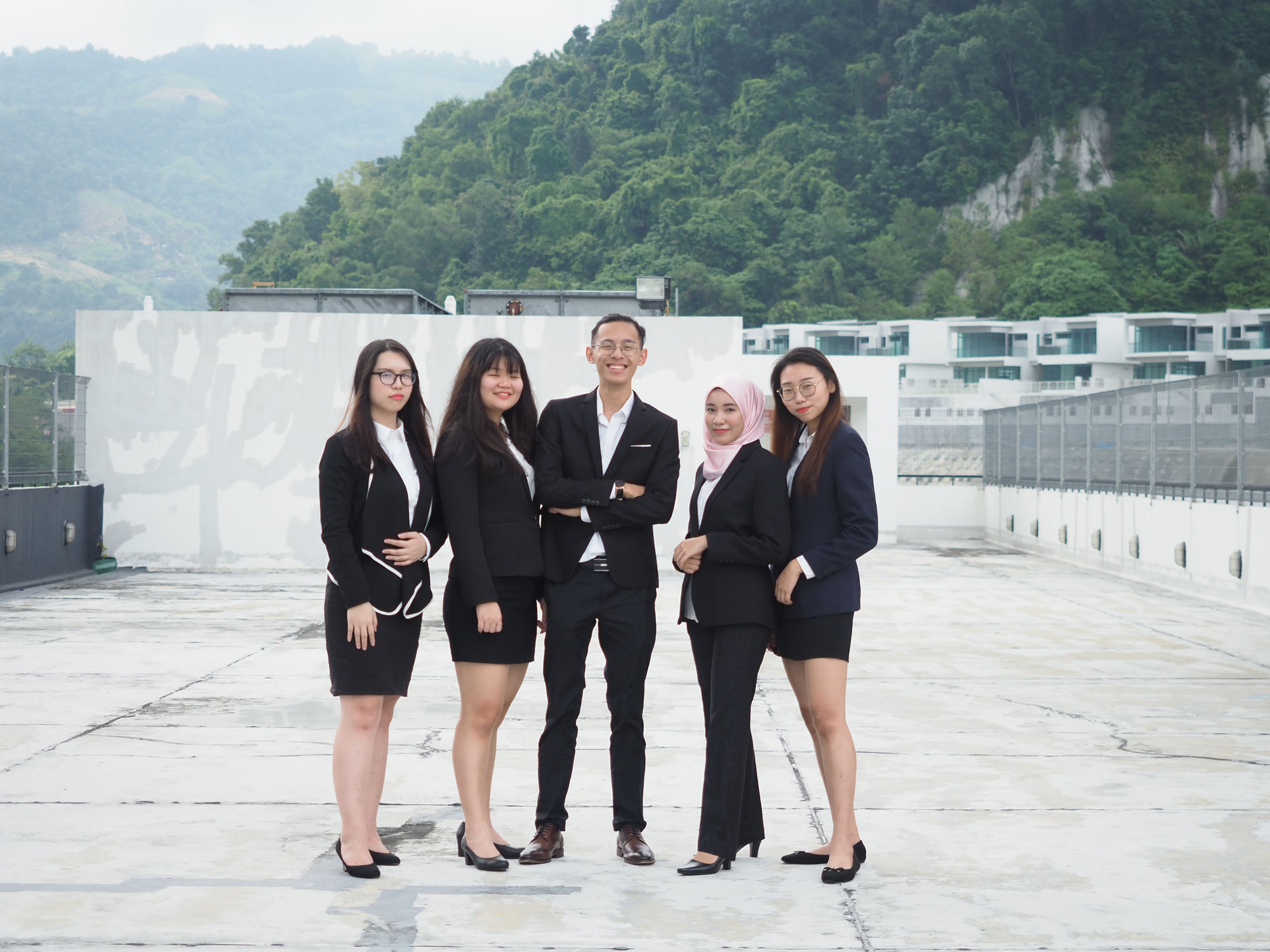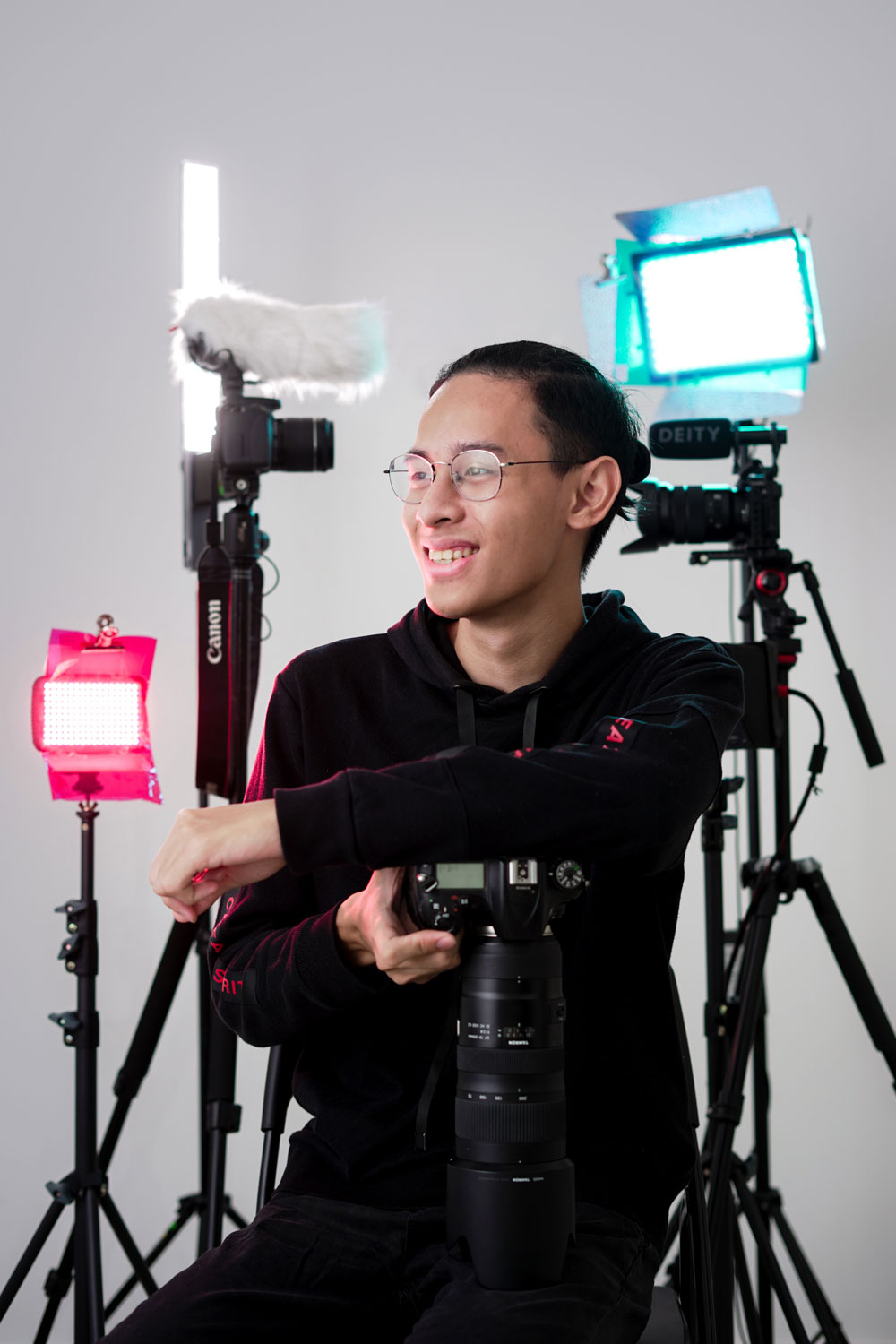In an ever-changing world with numerous unexpected challenges, young individuals need agility, perseverance and endurance to not only survive but thrive. A hopeful young person of 23, Jason Cheah Seang Hong has developed all of these traits, partly thanks to the adversities he met with recently while working in a slum area in Kolkata, India.

Jason Cheah Seang Hong (centre) with his coursemates from the Bachelor of Mass Communication programme, working on a media project assignment to produce a corporate video for INTI International College Penang.
Looking at this Year-2 student who is currently pursuing his Bachelor of Mass Communications from the University of Hertfordshire, United Kingdom, a programme he does locally at INTI International College Penang, one may wonder how this rare opportunity of working in a slum came to him.
A student and a business owner
A tenacious individual within a youthful demeanour, Jason started up his own business not long after starting his studies at INTI.
“I was lucky enough to start-up my creative studio in the second year of my degree studies. While focusing on my studies, I have also been looking for opportunities for my company to be involved in international projects,” stated the Penangite who comes from SMK Kampong Kastam.
“Working with Matt Brandon, the renowned Fujifilm ambassador, on a series of tutorial videos on travel photography in a slum area at Kolkata, India, was one of my most exciting and challenging projects,” he stated.
For this project, Jason was hired directly by the leading photographer who originated from Alaska and is now based in Penang.
“I was assigned to be the Cinematographer, Sound Recordings Operator and Video Lighting Operator for five days.”
Sharing one of the most arduous tasks he had ever faced in his life, Jason highlighted the challenges of working under difficult circumstances in Kolkata, which included working long hours in an unhygienic slum, not having clean drinking water and food, inadequate rest and having to haul a load of heavy equipment each day while remaining focused on the task at hand.

Jason Cheah Seang Hong (centre) with his coursemates from the Bachelor of Mass Communication programme, working on a media project assignment to produce a corporate video for INTI International College Penang.
Adversities of working in a city slum
“Matt and I travelled to several locations in Kolkata, filming the content for 10 episodes of tutorial videos. Every day, we woke up at about 3 a.m. We started filming from 4 a.m. and ended around 6 p.m. Apart from my responsibilities during the day, I also had several tasks to complete on the sidelines. After having dinner and meeting at about 9 p.m., I need to ensure all our files were backed-up. As the file sizes were about 100TB each day, transferring it was time-consuming, sometimes requiring me to stay up past midnight. It was the same routine every day.”
As the video crew were working in the slums most of the time, getting clean food and beverages was a great challenge.
“We tried to avoid filthy tap water as much as possible, but that left us with nothing much else to drink. We could barely find a place for soft drinks or a hot meal, and most of the time, we would take hot Chai and pastries being sold by street vendors.”
Working with international partners
Besides environmental adversities, Jason was also mindful of delivering good quality work at all times. In spite still being a student who had only just started up his business, Jason still had to maintain the expectations of being a qualified production company when working with these international partners, to get the filming project done.
“Different cultures do business differently. Working in a foreign country with an international crew was a great way to practice patience and tolerance while learning the values and cultures of others – including how they work” Jason elaborated in a tone that belied his young age.
As a self-declared perfectionist, what Jason enjoyed the most while working with an international team was the exchange of ideas, learning about market needs and trends, as well as learning from their experiences in cinematography and photography.
Jason also discovered how he could apply the knowledge he had gained from his studies to the hands-on experiences from working actively in his field. The overall experience has played an incredible role in enhancing his academic performance and portfolio.
Hidden dragons, crouching tigers
“I got to learn what I had never learned in the classroom, and I applied the knowledge and techniques of what I have learned from the industry into my assignments,” chuckled Jason, who started working as a freelance photographer and cinematographer since his second semester in INTI’s Diploma in Mass Communication programme, with opportunities arranged by his lecturers for photography and film production.
Jason indicated that networking was one of the most important assets for his business start-up and he received a great deal of support from his faculty right from the very beginning. In addition to connecting him with industry partners, his lecturers also coached him on filming techniques and other technical skill sets.
He stated, “Learning professional film-making techniques has empowered me to impress clients with my level of skills and connect to more people from the industry.”
Sharing his insights with other budding entrepreneurs, Jason advises his juniors to take the leap in embarking on their initiatives and to develop their future careers by making use of all the advantages provided by their institutions and faculties, including networking with industry experts.
“Many of our faculty are like hidden dragons and crouching tigers who could support you the most when you least expect!” he said.